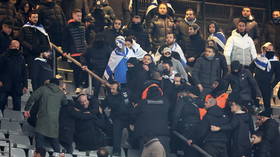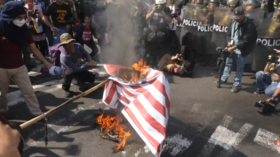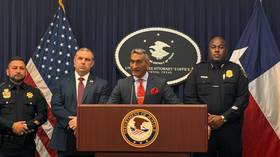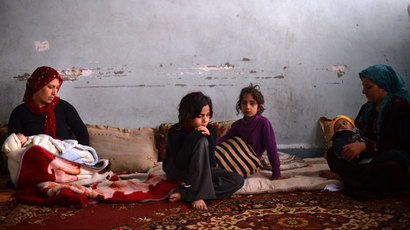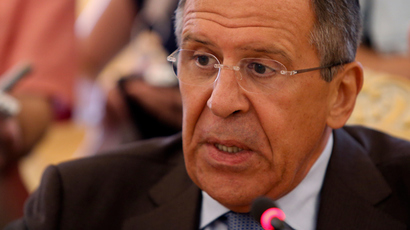Kurds in way: Witness account of atrocities as Al-Nusra Front asserts northern Syria position
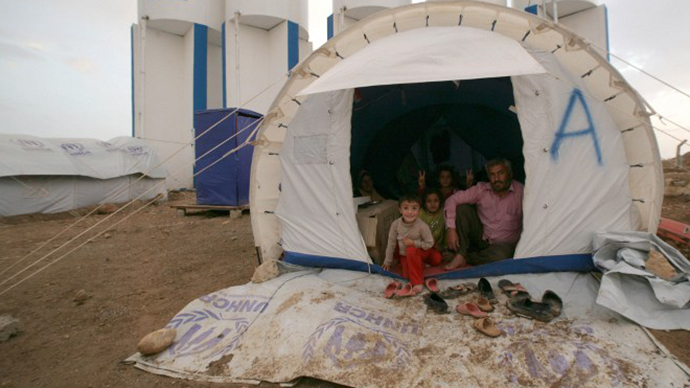
Witnesses are starting to emerge with grisly tales of kidnapping, rape and murder of Kurdish minorities in the north and north-east of Syria. Clashes between Al-Qaeda-linked militants and soldiers of the Kurdish Front have sunk the region into chaos.
“When civilians escaped, they were shot, and militia raided houses, blowing up some and robbing others… they still have more than 200 civilian hostages,” Zakaria Mohammed said speaking exclusively to RT Arabic about the violence that started out with an assault on four towns in the north of Syria.
Mohammed is a speaker and activist for the Kurdish Front, who bore witness to events that began one weekend in late July, as several battalions of FSA, Al-Nusra Front and Islamic State of Iraq and the Levant fighters surrounded their headquarters in the town of Tal Hasel.
The clashes quickly spread to Tal Aran, Tal Abyad, and Serekaniye. As a result of there not being any reinforcements to support Kurdish troops’ smaller numbers, the civilian withdrawals resulted in massacres and the kidnapping of over 500 people.
According to Mohammed, those who had managed to escape are currently in safe houses in the city of Afreen. Telecommunications with Tal Aran and Tal Hasel have been severed. Many people, however, are still in danger as violence may once again flare up. Jabhat Al-Nusra Front, together with the Islamic State of Iraq and the Levant, control the area.
Some have since returned to their homes, facing strict checks by Al-Nusra Front, to determine if they belong to any specific political grouping. Those that do are killed. In any case, one major theory of Islamist anger at the Kurds is the latter’s unwillingness to partake in the wider Syrian conflict. Their ethnic and cultural identity has left Kurds on the sidelines of the wider Syrian conflict.
The Kurdish Democratic Union Party (PYD) is issuing reports that “hundreds of Kurdish civilians have been kidnapped, tortured and their houses have been looted and burned down. These ongoing brutal massacres are targeting all Kurdish civilians in Qamishli, Kobani and Afreen areas.”
The events that started in mid-July have culminated in the
carnage of August 5, when 450 people were allegedly killed in Tal
Abyad and the surrounding area, with horrific footage emerging
from Iranian channel, Al-Alam.
RT contacted the United Nations in an attempt to verify the
video’s authenticity. Spokesperson for the UN High Commissioner
for Human Rights, Cecile Pouilly, said the video provided by the
Iranian channel actually “seems to date back to December
2012.”
It was originally posted on YouTube under the title
“Homosexuals burned alive in Iraq.”
“According to several sources, the incident itself would date
back to April 2011,” Pouilly said.
Although the media still has no information on either numbers or the particulars of that day, some Kurds are coming out with very similar reports of recent lootings and attacks on their settlements by Islamic extremists and FSA troops.
“The Al-Nusra militants and other rebel forces surrounded the village,” Yasin Tarbush, a relative of one of the Kurdish attack victims, told RT on August 7. “They started going door to door, entering every house. If there were any men, they killed them and took the women and children hostage.”
Implications and prognoses
Rumors abound of a plan for genocide of the Kurds at the hands of Islamic extremists seeking control of the area, as the minority appeals for help from the international community. However, it is a tricky situation, as the northern-Syrian Kurds are sealed off from the rest of Syria by Al-Qaeda-dominated areas to the south, and Turkey – the biggest opponent of Kurdish independence – to the east.
Further complicating an objective approach to the Kurdish question is the fact that Turkey is an important NATO member, and secondly, that terrorist gangs may well be cooperating with fighters of the Free Syrian Army – a force backed by Western and regional powers in their attempt to topple Syrian President Bashar Assad.
Russian Foreign Minister Sergey Lavrov has spoken on the matter, urging quick action on the part of the UN to condemn the alleged atrocities and bring extremism in Syria under control before hundreds more Kurds are killed.
A Kurdish source at the PYD told RT that, despite Turkish denial of any support to Al-Nusra Front and other militants, it has been carrying out logistics operations across several of its border crossings with northern Syria.
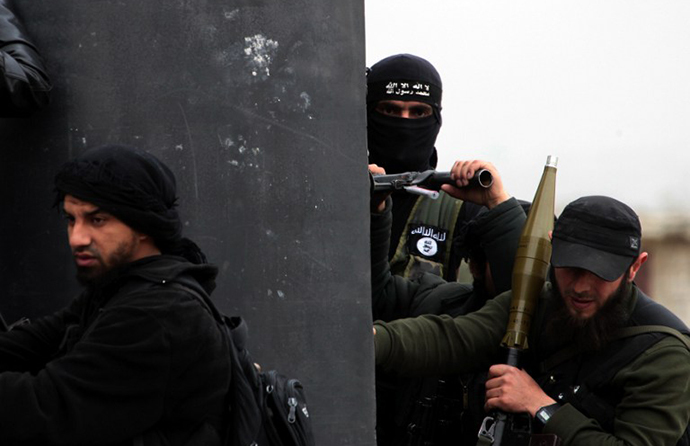
The appeal to ‘Defend the Kurds in Syria from massacre and ethnic cleansing’, written by an organization called ‘Peace in Kurdistan’, clearly outlines the Kurdish position:
“Peace in Kurdistan supports the proposals for a comprehensive peace settlement in Syria put forward by the PYD and supports the right of the Kurds in Syria to exercise democratic self-government in the region” and “the release of any civilian hostages held by rebel groups and urges an immediate halt to the arms supplies to these factions who are turning their weapons on innocent civilians and carrying out war crimes.”
It remains to be seen how this incredibly volatile situation will play out in the coming weeks. As a lecturer at the American University in Washington DC, Edmund Ghareeb, told RT, Syria’s civil war has already become more complex even without the Kurds participating in it, and that these latest happenings may go a long way toward creating a dangerous power vacuum in north-eastern Syria.
“The Kurds are becoming concerned over the growing power of [radicals Islamists]… Both sides are trying to control this area, which is close to Turkey, which has its own problems with its own Kurdish minority and is becoming very concerned with the events in Syria – since it supports the opposition in Syria – and is very much concerned that the vacuum near the border could spill over into its own territory and inflame the situation further than it’s already inflamed in Turkish Kurdistan… it’s a very complex, multi-sided conflict.”
Yet, a new complication has arisen with the takeover of the area of Kobani by Al-Nusra Front – an event that has sparked Kurdish protests all the way in Iraq, asking the Kurdish regional government there to aid the Kurds in Syria. All this is threatening to pull Iraq into the mix, and has become a “very fluid, complicated and volatile” situation, Ghareeb sees it.
Following a letter by the PYD to the international community, the UN Human Rights office in Geneva has promised an investigation into what many are already calling a plan for genocide of the Kurds. However, no punishment or accusations will emerge until (or unless) the organization decides that the events actually constitute a war crime.



